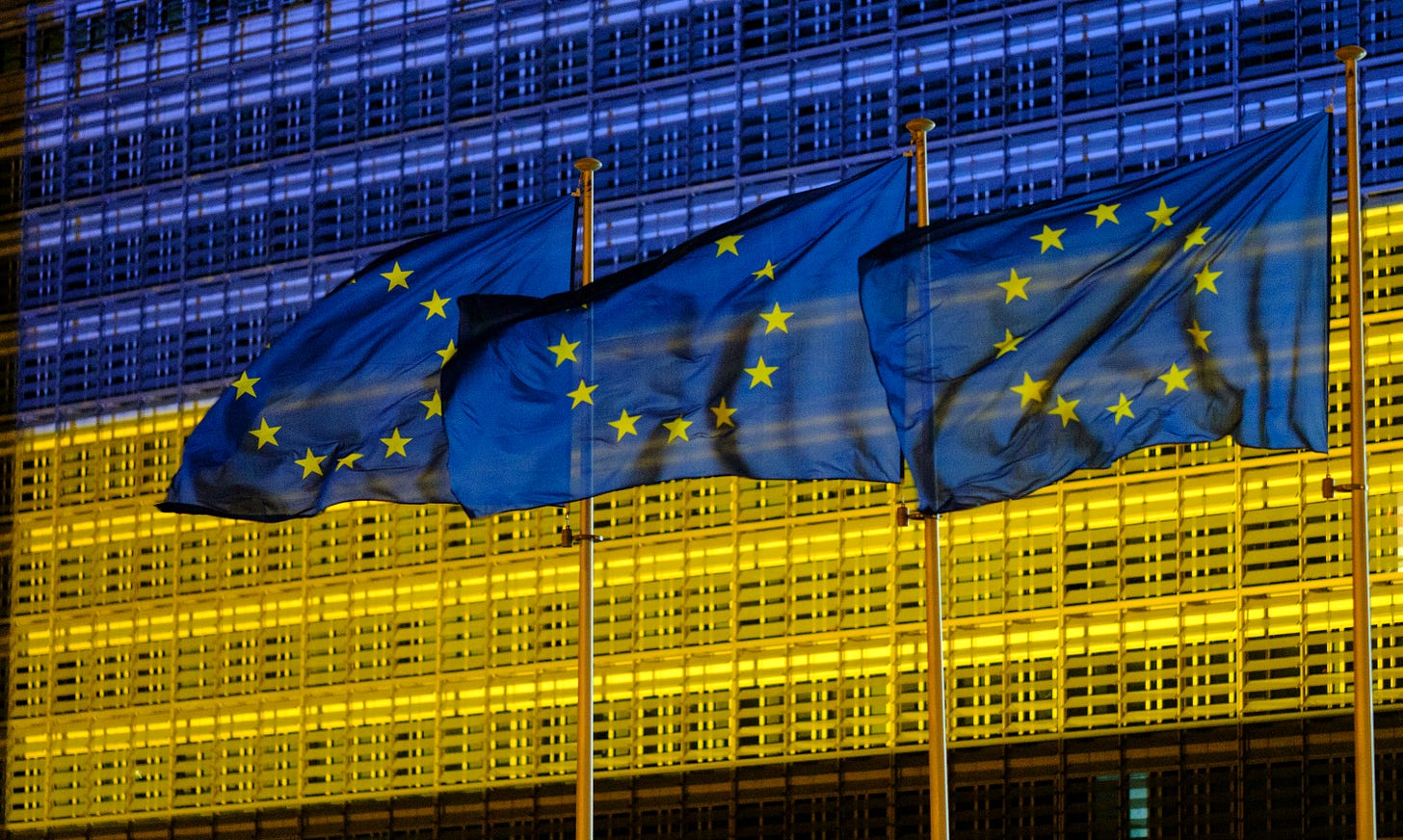Ukraine’s European Aspirations and Anxiety
The expected negotiations for Ukraine to join the EU are a fulfillment of Ukraine’s desires—but also a test of their feasibility.

IN THE MIDST OF a stalled offensive and wavering international support, good news about Ukraine has been in short supply lately. Yet, the European Commission’s recommendation, issued last week, that the EU open accession talks with Ukraine is heavy with symbolism for Ukrainians and provides a glimmer of much-needed hope for the country’s future.
The centrality of the EU in the Ukrainian imagination is difficult for Americans and Western Europeans to appreciate. In Kyiv, the EU is seen not as an unwieldy bureaucracy performing useful but unexciting technocratic tasks, but as a legal and symbolic embodiment of the country’s political, economic, and cultural aspirations.
Ten years ago this month, then-president of Ukraine Viktor Yanukovych announced that he was discarding Ukraine’s association agreement with the EU at the last minute in favor of closer links to Russia. The announcement prompted a wave of protests on Kyiv’s Maidan Square, which resulted ultimately in Yanukovych’s resignation and escape to Russia—the event Ukrainians call the Revolution of Dignity. Russia’s initial attack on Ukraine came just days later, and that war continues today.
A vast majority of Ukrainians (92 percent, according to a 2023 poll) support EU membership by 2030. It’s not hard to see why: The EU remains key to the story of the Ukrainian nation as a market democracy embedded in the community of prosperous, free nations of the West. Thanks in part to Yanukovych, the EU has become almost synonymous with Ukraine’s dignity and sovereignty; its ability to choose its own course free from Russian domination. Ukrainian Foreign Minister Dmytro Kuleba wrote that Ukraine’s “fight and sacrifices are not in vain. Our transformation is recognized. Our dreams and hopes are coming true.”
Not so fast. The EU, for all it symbolizes, is still a bureaucratic, unwieldy international body requiring a substantial degree of internal consensus to reach any decision. Accession negotiations, covering three dozen thematic “chapters” covering different aspects of EU law and policies, can take years. Turkey started its negotiations in 2005, only to hit roadblocks in the 2010s and have its accession talks eventually frozen. Turkey’s turn to authoritarianism and lack of progress in bringing Turkish institutions up to European standards were to blame—but so was the fact that accession is a political process that has to be endorsed unanimously by all member states.
At the moment, there are at least two EU members that are openly unfriendly to Ukraine: Hungary and Slovakia. Hungary, which initially indicated it might block Sweden and Finland’s accession to NATO and whose foreign minister claimed last week that Ukraine “was not ready” for EU membership, may be susceptible to being cajoled or bought off. Slovakia, with its new pro-Russia, Euro-skeptical, left-populist, anti-Ukrainian government, may also be obstinate.
Even in Poland, which has been exemplary in its support to Ukraine, special interests are fearful of competing with Ukrainian businesses in an open European market, which is what Ukrainian membership would entail. On top of the controversy over Ukrainian grain exports, Polish truckers are currently blocking border crossings with Ukraine to protest competition from Ukrainian drivers, who have been operating in the EU under relaxed restrictions since the beginning of the war.
Given Ukrainians’ enormous sacrifices, expectations are understandably high. To its credit, the EU is establishing a fund of $50 billion for Ukraine for the years 2024-2027. That’s more than Congress has been able to do in many months. But even the most conservative estimates of the costs of Ukraine’s post-war reconstruction are in the range of several hundreds of billions—a bill that will most definitely not be paid by U.S. taxpayers.
Money, however, is only one part of the story. In the long term, full access to the EU’s markets for labor, services, and goods is more important than reconstruction aid to the sustained growth of Ukraine’s standards of living. Ukrainians are hopeful for steady progress and tangible effects of closer economic and political ties with the EU. If instead they’re stranded in an extended limbo, cynicism could set in, much like in the Western Balkans. That would be bad news for the EU and the United States—a disaffected Ukraine could easily become an erratic geopolitical player with a geopolitical axe to grind, like a larger Serbia or another Turkey.
Finally, there is the elephant in the room: Ukraine’s security. Appeasers in Western European capitals, and perhaps some in the Biden administration, might already be thinking about how the EU accession process can be used to force President Zelenskyy into negotiations with the Kremlin. But as long as Russia remains governed by a gang of war criminals, Ukrainians understand that the only prospect for a durable peace lies in the effective deterrence of future Russian aggression— either through membership in NATO or by turning Ukraine into a hyper-militarized (possibly nuclear-armed) porcupine.
Ukrainians have good reasons to remain committed to their country’s European future, and the European Commission deserves credit for moving the process along. Yet, the promise of accession without a simultaneous strategy for Ukraine’s victory and long-term security means little. Ukraine’s long-term future is all but decided; yet in the short term it remains in grave peril.




